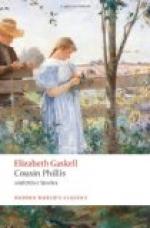believe that the worst was over, and was not so very
bad after all. But the succeeding days were very
miserable. Sometimes I thought it must be my fancy
that falsely represented Phillis to me as strangely
changed, for surely, if this idea of mine was well-founded,
her parents—her father and mother—her
own flesh and blood—would have been the
first to perceive it. Yet they went on in their
household peace and content; if anything, a little
more cheerfully than usual, for the ‘harvest
of the first-fruits’, as the minister called
it, had been more bounteous than usual, and there
was plenty all around in which the humblest labourer
was made to share. After the one thunderstorm,
came one or two lovely serene summer days, during
which the hay was all carried; and then succeeded long
soft rains filling the ears of corn, and causing the
mown grass to spring afresh. The minister allowed
himself a few more hours of relaxation and home enjoyment
than usual during this wet spell: hard earth-bound
frost was his winter holiday; these wet days, after
the hay harvest, his summer holiday. We sate with
open windows, the fragrance and the freshness called
out by the soft-falling rain filling the house-place;
while the quiet ceaseless patter among the leaves
outside ought to have had the same lulling effect
as all other gentle perpetual sounds, such as mill-wheels
and bubbling springs, have on the nerves of happy
people. But two of us were not happy. I was
sure enough of myself, for one. I was worse than
sure,—I was wretchedly anxious about Phillis.
Ever since that day of the thunderstorm there had
been a new, sharp, discordant sound to me in her voice,
a sort of jangle in her tone; and her restless eyes
had no quietness in them; and her colour came and
went without a cause that I could find out. The
minister, happy in ignorance of what most concerned
him, brought out his books; his learned volumes and
classics. Whether he read and talked to Phillis,
or to me, I do not know; but feeling by instinct that
she was not, could not be, attending to the peaceful
details, so strange and foreign to the turmoil in
her heart, I forced myself to listen, and if possible
to understand.
‘Look here!’ said the minister, tapping
the old vellum-bound book he held; ’in the first
Georgic he speaks of rolling and irrigation, a little
further on he insists on choice of the best seed,
and advises us to keep the drains clear. Again,
no Scotch farmer could give shrewder advice than to
cut light meadows while the dew is on, even though
it involve night-work. It is all living truth
in these days.’ He began beating time with
a ruler upon his knee, to some Latin lines he read
aloud just then. I suppose the monotonous chant
irritated Phillis to some irregular energy, for I
remember the quick knotting and breaking of the thread
with which she was sewing. I never hear that snap
repeated now, without suspecting some sting or stab
troubling the heart of the worker. Cousin Holman,
at her peaceful knitting, noticed the reason why Phillis
had so constantly to interrupt the progress of her
seam.




